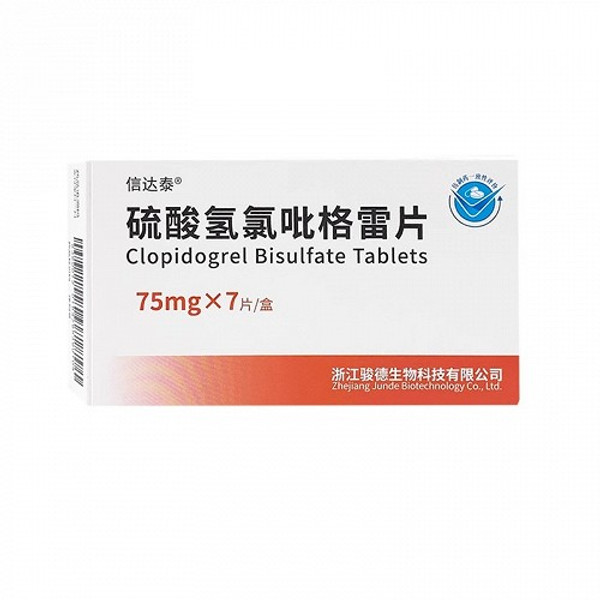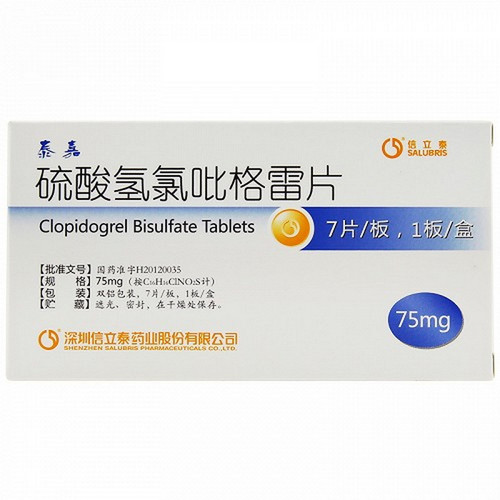Product Overview
[Drug Name]
Generic Name: Clopidogrel Bisulfate Tablets
Trade Name: Xindatai Clopidogrel Bisulfate Tablets, 75mg x 7 tablets
[Main Ingredients]
The main ingredient of this product is clopidogrel bisulfate. Its chemical name is S(+)-2-(2-chlorophenyl)-2-(4,5,6,7-tetrachlorothieno[3,2-C]piperidin-5-yl)acetate methyl sulfate. Molecular formula:
C₁₆H₁₆CINO₂S·H₂SO₄. Molecular weight: 419.90
[Properties]
This product is a white or off-white tablet or film-coated tablet. After removal of the coating, it appears white or off-white.
[Indications/Main Functions]
Clopidogrel is indicated for the secondary prevention of atherothrombotic events in the following patients: patients with a recent myocardial infarction (from a few days to less than 35 days), patients with a recent ischemic stroke (from 7 days to less than 6 months), or patients with established peripheral arterial disease. Patients with acute coronary syndromes: - Non-ST-segment elevation acute coronary syndromes (including unstable angina or non-Q-wave myocardial infarction), including those undergoing percutaneous coronary intervention with stent implantation, in combination with aspirin. - For patients with ST-segment elevation acute coronary syndromes, in combination with aspirin, and may be used in conjunction with thrombolytic therapy.
[Specifications]
75mg*7 tablets
[Dosage and Administration]
The recommended dose of clopidogrel for adults and the elderly is 75mg once daily. Take orally with or without food. For patients with acute coronary syndromes: - Patients with non-ST-segment elevation acute coronary syndromes (unstable angina or non-Q-wave myocardial infarction) should start with a single loading dose of clopidogrel 300mg (in combination with 75mg-325mg/day aspirin), followed by a continuous dose of 75mg once daily. Because higher doses of aspirin are associated with a higher risk of bleeding, the recommended daily maintenance dose of aspirin should not exceed 100mg. The optimal duration of treatment has not been formally established. Clinical trial data support a 12-month course, with maximum efficacy observed after three months. - ST-segment elevation acute myocardial infarction: Start with a loading dose of clopidogrel, followed by 75 mg once daily, with aspirin, with or without a thrombolytic agent. Do not use a clopidogrel loading dose in patients over 75 years of age. Combination therapy should be initiated as soon as possible after symptom onset and continued for at least four weeks. No studies have demonstrated the benefit of combining clopidogrel and aspirin for more than four weeks. For patients with a recent myocardial infarction (from a few days to less than 35 days), a recent ischemic stroke (from seven days to less than six months), or established peripheral arterial disease: The recommended dose is 75 mg daily. If a dose is missed: - Within 12 hours of the regularly scheduled dose: Patients should take a missed dose immediately and the next dose at the regularly scheduled time. - More than 12 hours after the regularly scheduled dose: Patients should take the standard dose at the next regularly scheduled time without doubling the dose. Children and Minors: Safety and effectiveness in patients under 18 years of age have not been established. Renal Impairment: There is limited experience in the treatment of patients with renal impairment. (See [Precautions]) Hepatic Impairment: There is limited experience in the treatment of patients with moderate hepatic impairment who have a bleeding tendency. (See [Precautions])
[Adverse Reactions]
See the package insert for details.
[Contraindications]
1. Hypersensitivity to the active substance or any of the ingredients of this product.
2. Severe hepatic impairment.
3. Active pathological bleeding, such as peptic ulcer or intracranial hemorrhage.
[Precautions]
Bleeding and Hematologic Abnormalities: Due to the risk of bleeding and hematologic adverse reactions, blood counts and/or other appropriate testing should be promptly considered if clinical symptoms of bleeding occur during treatment. As with other antiplatelet agents, clopidogrel should be used with caution in patients at increased risk of bleeding due to trauma, surgery, or other pathological conditions, and in patients receiving aspirin, nonsteroidal anti-inflammatory drugs (NSAIDS) including Cox-2 inhibitors, heparin, platelet glycoprotein Ib/Ib/Ib/Ib/Ib antagonists, selective serotonin reuptake inhibitors (SSRIs) and serotonin norepinephrine reuptake inhibitors (SNRIs), or thrombolytics. Patients should be closely monitored for any signs of bleeding, including occult bleeding, particularly during the initial weeks of treatment and/or after cardiac intervention or surgery. Concomitant use of clopidogrel with warfarin is not recommended due to the potential for exacerbation of bleeding. For patients undergoing elective surgery, if antiplatelet therapy is not necessary, clopidogrel should be discontinued 7 days before surgery. Before any scheduled surgery and before taking any new medications, patients should inform their physician that they are taking clopidogrel. Clopidogrel prolongs bleeding time and should be used with caution in patients with bleeding disorders (particularly gastrointestinal and intraocular disorders). Patients should be informed that bleeding may take longer than usual to stop while taking clopidogrel (alone or with aspirin), and they should report any unusual bleeding (location and duration) to their physician. Discontinuation of treatment should be avoided; if clopidogrel must be discontinued, it should be resumed as soon as possible. Premature discontinuation of clopidogrel may increase the risk of cardiovascular events. Thrombotic thrombocytopenic purpura (TTP): Thrombotic thrombocytopenic purpura (TTP) has rarely occurred with clopidogrel use, sometimes after a short period of use (< 2 weeks). TTP can be life-threatening. It is characterized by thrombocytopenia, microangiopathic hemolytic anemia, accompanied by neurologic manifestations, renal impairment, or fever. TTP is a condition requiring urgent treatment, including plasma exchange. Recent ischemic stroke: Due to lack of data, clopidogrel is not recommended within 7 days of acute ischemic stroke. Acquired hemophilia:Cases of acquired hemophilia have been reported following the use of clopidogrel. Acquired hemophilia should be considered in the presence of a clearly prolonged in vitro activated partial thromboplastin time (aPTT) with or without bleeding. Patients with confirmed acquired hemophilia should be managed and treated by a specialist, and clopidogrel should be discontinued. Cytochrome P450 2C19 (CYP2C19): Pharmacogenetics: In patients with poor CYP2C19 metabolizers, the blood concentration of the active metabolite of clopidogrel at recommended doses is reduced, resulting in reduced antiplatelet effect. Methods are available for testing patients for CYP2C19 genotype. Because clopidogrel is partially metabolized to its active metabolite by CYP2C19, the use of drugs that inhibit this enzyme may reduce the conversion of clopidogrel to its active metabolite. The clinical relevance of drug interactions has not been determined. Concomitant use of strong or moderate CYP2C19 inhibitors is not recommended. In patients with a recent transient ischemic attack or ischemic stroke who are at increased risk for a recurrent ischemic event, the combination of aspirin and clopidogrel has not been shown to be more effective than clopidogrel alone; however, it increases the risk of bleeding. Cross-Reactions with Thienopyridines: Thienopyridines may cause mild to severe hypersensitivity reactions, such as rash, angioedema, or hematologic adverse reactions, such as thrombocytopenia and neutropenia. Because cross-reactions between thienopyridines have been reported, patients should be evaluated for a history of hypersensitivity to other thienopyridines (e.g., ticlopidine and prasugrel) (see Adverse Reactions). Patients who have previously experienced allergic reactions and/or adverse hematologic reactions to one thienopyridine may be at increased risk for the same or other adverse reactions to another thienopyridine. Monitoring for cross-reactivity is recommended. Renal Impairment: Experience with clopidogrel in patients with renal impairment is limited; therefore, clopidogrel should be used with caution in these patients. Hepatic Impairment: Experience with clopidogrel in patients with moderate liver disease who may have a bleeding diathesis is limited; therefore, clopidogrel should be used with caution in these patients. Excipients containing lactose should not be used by patients with rare hereditary conditions such as galactose intolerance, Lapp lactase deficiency, or glucose-galactose malabsorption (this product is formulated without lactose). No effects have been observed with clopidogrel on driving or operating machinery. This product contains hydrogenated castor oil, which may cause stomach upset and diarrhea.










